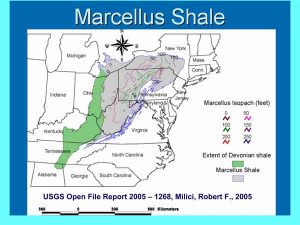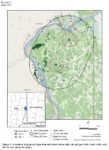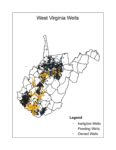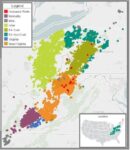There will be at least two comprehensive proposals regulating Marcellus Shale for the legislature to consider this session.
The first (SB 424 and HB 3042) is a bill prepared by the WV Department of Environmental Protection (DEP), and is a result of the agency’s review of its oil and gas regulatory program. The DEP bill creates new language dealing with horizontal drilling, but also makes changes that affect conventional (shallow) drilling.
The second is a bill prepared by legislative staff for an interim study committee. The “Hydraulic Fracturing and Horizontal Drilling Gas Act” (SB 258 and HB 2878) would establish a new regulatory program for gas wells utilizing horizontal drilling and hydraulic fracturing.
Both bills are long and legally and technically complex. What follows is a summary of how the bills attempt to address major areas of concern for citizens and the environment. The summary contains excerpts from a comparison of the bills prepared by Don Garvin, Legislative Coordinator for the WV Environmental Council. In addition to Don’s comparison, WV-SORO and WVEC also have a side-by-side of the two proposals.
Update 2/28/11: Bills are advancing in both the House and Senate. Please see our Updates and Alerts for the latest. Click here to see an updated side-by-side of the bills as of 2/27/11.
- Land Use and Surface Owners’ Rights
- Water Quantity and Quality
- Disclosure of Chemicals Used in Hydraulic Fracturing
- Waste Management and Disposal
- Air Quality
- Impacts on Roads and Bridges
- Coordination with Emergency Services
- Corporate Accountability
- Local Jobs for Local Workers
- Reforming Hiring Practices and Funding for Inspectors
- Forced Pooling
Land Use and Surface Owners’ Rights
Both bills provide earlier notice to surface owners that the driller is coming. The DEP bill requires that for all wells, “prior to receiving a permit, the operator will provide notice to the surface owner at least seventy-two hours but no more than forty-five days prior to entering the surface tract to conduct any plat surveys.” The DEP bill also requires the operator to provide notice to the surface owner two to seven days before any actual disturbance of land, if the surface owner requests that notice as a part of his or her comments on the permit application. The DEP bill increases the current comment period from 15 days to 30 days for all well work.
The notice provisions in the Judiciary (interim) bill are better, but apply only to horizontal wells. The Judiciary bill would require the operator give the surface owner at least fifteen days notice before entry for surveying, and as part of the notification, creates a process to encourage the driller to work with the surface owner in planning where and how well sites and access roads will be built, reclaimed and maintained.
In addition to the enhanced notice provisions for horizontal wells, the Judiciary bill also increases the distance these wells must be from dwellings and water wells. Under the Judiciary bill, no horizontal well could be drilled within 1,000 feet of “any existing building or water well” without the written consent of the owner. The DEP bill continues the 200-foot setback requirement for all wells.
Finally, the DEP bill would require companies performing geophysical seismic testing to notify surface owners and others at least thirty (30) days prior to any planned testing and seventy-two (72) hours before any blasting activity. The notice would also include a reclamation plan. These requirements are good but don’t address the complaints we received regarding activities in Lewis and Upshur County.
Water Quantity and Quality
With regard to water withdrawals, both bills require that an application to drill a horizontal well include a “water management plan.” The water management plan provisions are primarily reporting and record keeping requirements that list the details of planned water withdrawals for drilling and fracturing the well, including the type of water source, specific location of water withdrawals, volumes of water to be withdrawn, and anticipated months the withdrawals will occur. Water management plans must contain “a water resources protection plan” that “includes documentation of measures that will be taken to allow the State to manage the quantity of its waters for present and future use and enjoyment and for the protection of the environment.”
Although neither bill requires an actual water withdrawal permit, the DEP bill comes closest to doing that. It requires the operator to identify and report the location of proposed water withdrawals forty-eight hours prior to the withdrawal. It also requires the operator to place signs at the location that identify that it as water withdrawal point. The sign must include the name and telephone number of the operator, and the permit number for which the water will be used.
For surface waters, the DEP bill adds a provision that no oil or gas well can be nearer than 100 feet from any surface water of the state, while the Judiciary (interim) bill provides that “no well site may be prepared or well drilled” within 100 feet “from any watercourse, natural or artificial lake, pond or reservoir or within 100 feet of the boundary of a wetland or the boundary that affects the functions and values of a wetland.” In addition, the Judiciary bill prohibits the use of horizontal drilling and hydraulic fracturing “within 2,500 feet of a surface water source, and within 1,000 feet of a groundwater source, that serves a public water system.”
For groundwater protection, the Judiciary bill requires the DEP to inspect “each permitted well drilled in any formation using hydraulic fracturing or horizontal drilling, or both, during each phase of cementing, completing and altering.” The Judiciary bill also requires the operator to conduct a pre-drilling test of the water supply, upon written request “by any landowner residing within 5,500 feet but farther than 2,500 feet of a proposed gas well using hydraulic fracturing.” Testing parameters are expanded to include chemicals or chemical compounds commonly used in hydraulic fracturing.
Both bills contain new requirements for water supply replacement. The DEP bill retains existing language that requires the operator to replace damaged or lost groundwater or surface water supplies, and the “rebuttable presumption” that the well drilling is the cause of the damage or loss if the supply is within one thousand feet of the well. However, the bill contains new language that requiring the operator to provide an emergency drinking water supply within twenty-four hours; provide temporary water supply within seventy-two hours; and begin activities to establish a permanent water supply, or submit a proposal for establishing a permanent supply, within thirty days. The total time allowed for establishing a permanent water supply may not exceed two years. It is not clear if these provisions cover public supplies, but they probably do.
The Judiciary bill requires the operator to replace groundwater or surface water supplies damaged by the drilling of horizontal wells. The Judiciary bill establishes a “rebuttable presumption” for horizontal wells that the well drilling is the cause of the damage or loss if the supply is within 2,500 feet of the well. For horizontal drilling, the presumption covers the entire length of each horizontal well bore. These provisions apply to both public and private water supplies.
Disclosure of Chemicals Used in Hydraulic Fracturing
Under both bills, the water management plan must contain a listing of the anticipated additives that may be used in fracturing or stimulating the well. The DEP bill requires that upon completion of a well, a listing of the actual additives used be submitted as part of the completion report.
The interim (Judiciary) bill is similar. It requires the operator to file a report with the DEP that includes the complete list of the chemicals and chemical compounds used, the volume of fluid used in each separate hydraulic fracturing operation and the Chemical Abstract Service registry number for each constituent chemical.
In case of a medical emergency, HB 2878 and SB 258, also require the operator to provide the concentration of each constituent chemical and the formula for each chemical compound to medical and other emergency personnel. The operator must keep a copy of this information at the well site and produce it at the request of DEP, local emergency personnel and landowners residing within 5,500 feet of the well.
Waste Management and Disposal
After fracing, much of the water used flows back out of the well. In addition to the chemicals used in hydraulic fracturing, this flowback water may contain naturally occurring radioactive materials and increased levels of salt. Flowback and other wastewater should be transported off-site, treated and disposed of safely.
Both bills would require the operator to record and maintain information regarding the quantity of flowback water from hydraulic fracturing the well, the quantity of produced water from the well; and the method of management or disposal of the flowback and produced water.
Both bills would also require the operator to record and maintain information regarding the transportation of wastewater, including the quantity of water transported, the collection and delivery or disposal locations of the water; and the name and address of the water hauler, and the company for which the hauler was hauling the water. However, neither bill addresses the lack of approved disposal facilities for handling the high volumes of wastewater generated.
The interim (Judiciary) bill would require that all pits and impoundments be constructed with a dual liner system with a leak detection system installed between the two liners, to prevent seepage or leakage. (Last year the legislature approved a DEP rule with new construction standards for large volume pits and impoundments. The rule makes it highly unlikely that drillers will not use impermeable synthetic pit liners, but exemptions are allowed and the rule does not contain liner specifications.)
Unfortunately, both bills continue to allow pit liners and the solid waste contained in them to be buried in unmarked sites on a surface owners land, sterilizing the area from future construction and other uses.
Air Quality
In addition to increases in surface disturbance, water use and waste disposal, Marcellus Shale development degrades air quality. Many of the processes involved with this development release nitrogen oxide (NOx), volatile organic compounds (VOCs) and other potentially harmful substances into the air. However, DEP claims to have no authority to regulate emissions from gas well sites. The DEP bill contains general environmental protection performance standards that require drillers to control particulate matter. This is the only mention of air quality issues in either bill.
Impacts on Roads and Bridges
West Virginia’s rural roads cannot handle the industrialization that is occurring due to Marcellus Shale development. Conventional drilling and production activities associated with oil and gas wells are transportation intensive. However, Marcellus Shale drilling operations increase traffic exponentially resulting in damage to existing roads and bridges and increased in accidents.
To address concerns about the damage to our infrastructure, the interim (or Judiciary) bill requires that a Department of Highways Certification be included with permit applications for horizontal wells. The certification would be in the form of a letter from the Department of Highways stating that the operator has entered into an agreement and is in compliance with all laws, regulations and conditions required by the DOH related to use, maintenance and repair of all state and county roads that will be used to access a well location. The DEP bill does not specifically address this concern, although DEP representative told members of the interim committee that something similar would be included on their checklist for ensuring that applications for drilling permits are “administratively complete.”
Coordination with Emergency Services
A series of incidents last year, including two well fires and explosions in Marshall County, highlighted the need for drillers to coordinate with local emergency services personnel and first responders. The DEP bill would require permit applications for all wells to include “a well site safety plan to address proper safety measures to be employed for the protection of persons on the site as well as the general public. The plan shall encompass all aspects of the operation, including the actual well work for which the permit was obtained, completion activities, and production activities.” Under the DEP bill, drillers must also have an “emergency action plans” in place for pits and impoundments with a capacity of more than 210,000 gallons.
Corporate Accountability
Both bills contain provisions aimed at ensuring companies seeking drilling permits are good corporate citizens.
The DEP contains a provision designed to prevent an operator who has had a permit revoked or forfeited a bond from operating and obtaining permits under another name or corporate shell.
The Judiciary bill requires the DEP to verify an applicant’s compliance with the state’s Labor Management Act and Unemployment and Workers Compensation Fund requirements, and check to see if they have posted the wage and benefit bonds required of entities that engage in “the severance, production or transportation of minerals.”
Local Jobs for Local Workers
Although the Judiciary bill in particular requires the DEP to verify a driller’s compliance with various labor laws, there is nothing in either bill to help ensure that employment opportunities created as a result of Marcellus Shale development go to local workers first. We support our labor allies in their efforts to require construction related activities such as drilling, pipeline installations and construction of processing facilities to comply with the WV Jobs Act.
Reforming Hiring Practices and Funding for Inspectors
Both bills would provide DEP with much needed funds to hire additional inspectors through an increase permit fees. The Judiciary bill establishes the following fees for horizontal wells:
- $15,000 initial application fee for each permit
- $15,000 reclamation fee
- $10,000 fee for to modify a permit
- $5,000 annual renewal fee
The DEP bill would set permit fees for horizontal wells at $10,000, but proposes no other new or increased fees. In addition, the DEP bill also reforms hiring practices by doing away with the Oil and Gas Inspectors’ Examining Board, which has been historically dominated by the oil and gas industry. The bill also does away with the requirement that inspectors have work experience in the industry to be hired and gives the DEP secretary the authority to hire inspectors under the civil service system.
Forced Pooling
By far the most complex and controversial provisions, in either bill deal with forced pooling. Forced pooling provisions were initially included in the Judiciary bill however, they were amended out by the interim committee that advanced the bill. Early drafts of the DEP excluded pooling, but the version of the bill that was introduced contains forced pooling provisions.
Because some in the industry want forced pooling, these provisions are considered to be the “carrot” or incentive needed to get keep them from opposing other provisions needed to protect citizens and the environment.
The drilling of multiple horizontal wells from centralized well pads has benefits for surface owners and the environment because one well site, access road and pipeline can replace more than 20 vertical well sites etc. (Forced pooling for all gas wells is a good idea, whether they are “shallow,” “deep” or horizontal because it is a fairer and a more economically efficient way of producing resources that are not confined to boundaries of an individual driller’s or mineral owner’s property (or rights.)
However, adoption of forced pooling statutes in order to make horizontal drilling from centralized pads possible in more cases is a good idea IF AND ONLY IF the statute offers proper protections for all interested parties and IF the statute is part of a variety of other reforms needed to protect surface owners and the environment.
The provisions proposed in the DEP bill are NOT good. They allow drillers to force huge horizontal well sites on fee and surface owners and eliminate well spacing for some vertical Marcellus wells. They also fail to ensure that unleased/forced mineral owners are paid what a lessee would get.
Click here for more background information on pooling and unitization (well spacing and royalty sharing).












